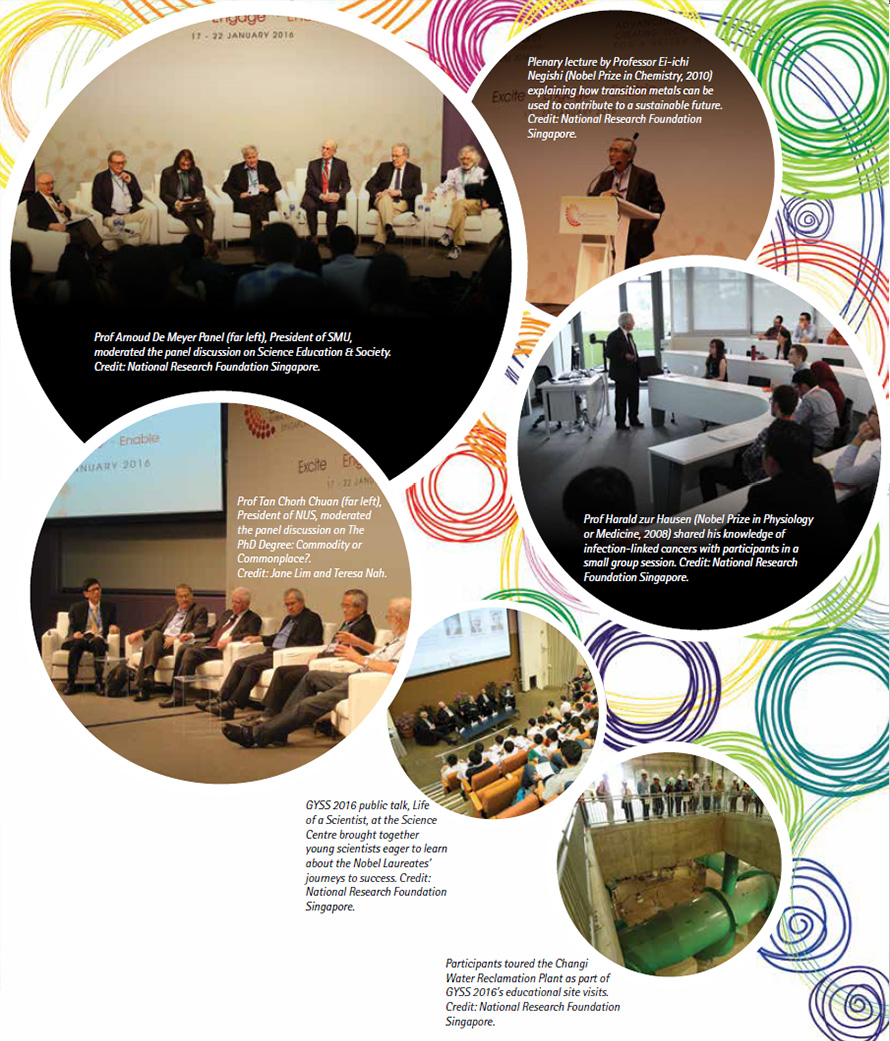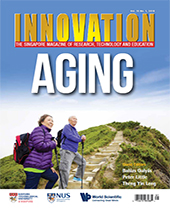|
by Jane Lim and Teresa Nah

 ngapore's fourth Global Young Scientist Summit (GYSS) 2016 was held from 17 to 22 January 2016 at the Singapore University of Technology and Design (SUTD). It was officially opened by Mr Teo Chee Hean, Deputy Prime Minister and Coordinating Minister for National Security, and Chairman of National Research Foundation Singapore, on the evening of 17 January 2016. ngapore's fourth Global Young Scientist Summit (GYSS) 2016 was held from 17 to 22 January 2016 at the Singapore University of Technology and Design (SUTD). It was officially opened by Mr Teo Chee Hean, Deputy Prime Minister and Coordinating Minister for National Security, and Chairman of National Research Foundation Singapore, on the evening of 17 January 2016.
The GYSS is an annual international gathering of young scientists and researchers (PhD students and postdocs) from around the world, with eminent international science and technology leaders in Singapore. These leaders are recipients of the Nobel Prize, Fields Medal, Millennium Technology Prize, and Turing Award. With these world-renowned scientific leaders as invited speakers, GYSS aims to excite and inspire young researchers to apply their minds to research that addresses serious global challenges and future needs of mankind. Through close and personal interaction sessions, the young researchers can engage and connect with like-minded peers and distinguished scientists. The Summit also offers participants with a compelling research proposition a chance to bring their ideas to fruition through the Singapore Challenge.
DPM Teo, in his opening speech, said that investing in R&D is essentially an investment in Singapore's future and will enable Singapore to become a knowledge-based economy and society. Singapore's R&D investments have helped to create economic value in Singapore, and good jobs for Singaporeans. It has changed our lives for the better through Science and Technology. It has also facilitated collaborations to be formed across borders. The attractiveness of our geographical position, multi-cultural population and cosmopolitan outlook has drawn researchers from different parts of the world to do research in Singapore, in a wide range of areas including diseases, mobility solutions, earth sciences, and environment systems.
As with previous years, the Summit consisted of plenary lectures by invited scientific leaders in the morning, followed by panel discussions and small group sessions with the speakers in the afternoon. This year's panel discussions were moderated by the President of National University of Singapore (NUS) Professor Tan Chorh Chuan, the President of SUTD Professor Thomas Magnanti, and the President of Singapore Management University (SMU) Professor Arnoud De Meyer.
The site visits in the last two days of the Summit included local universities, research centres and local public agencies. Participants had the opportunity to visit places such as the URA City Gallery, Marina Barrage, Changi Water Reclamation Plant, Gardens by the Bay and Changi Airport to learn how Singapore applies science and technology in these places.
Approximately 500 people had gathered for this annual event — 21 top science and technology speakers, 300 young scientists from over 80 universities, research institutes and companies, and 150 guests from the research community and industry. A third of the participants were from Singapore, a third from Asia and Australia, and a third from America, Europe and the rest of the world.
The 21 distinguished speakers at the 2016 Summit comprised 13 Nobel Laureates from chemistry, physics and physiology or medicine, four Turing Awardees, two Fields Medallists and two Millennium Technology Prize Winners.
The Summit was closed by Singapore President Tony Tan Keng Yam at SUTD on the evening of 22 January 2016. In his speech, President Tan said that Singapore has developed multiple paths of success in our school system for young people across different fields, including in science and mathematics. He emphasized the need for our youths to develop the curiosity to discover, the desire to experiment, and the respect for people who set out to develop new knowledge. He concluded his speech by encouraging the participants to maintain and further the friendships and networks built during the dialogue after the Summit.
Singapore Challenge 2016
The Singapore (SG) Challenge is a special feature of GYSS. It provides the GYSS participants an opportunity to present their research ideas and solutions to address challenges faced by global cities.
The SG Challenge Medallion and a cash prize of USD100,000 are awarded to the most compelling idea based on the novelty and potential impact of the proposal. The winner is encouraged to use the prize money to develop the proposal further with an appropriate Singapore public agency or government-funded research institute/laboratory.
The partner agency for the SG Challenge 2016 was the Ministry of the Environment and Water Resources. The theme for this year's challenge was Sustainable and Liveable Cities. Participants were encouraged to submit proposals for technical and non-technical ideas to safeguard and conserve resources such as water and energy, or to enable sustainable living for current and future generations with a higher quality of life focused on green and blue spaces, clean air, a quieter living environment, enhanced public cleanliness and waste management, etc.
A total of 48 proposals were submitted by the young scientists. Eight finalists' projects ranging from pathogen detection to big data and artificial intelligence, and greywater recycling to air filter membrane were shortlisted for presentation to the final judging panels chaired by Professor Michael Grätzel from École Polytechnique Fédérale de Lausanne and winner of Millenium Technology Prize 2010.
Mr Carlos Duarte-Guevara, a fifth year PhD student at the University of Illinois at Urbana-Champaign, was awarded the Singapore Challenge 2016 prize. He impressed the judges with his research proposal, Portable Detection of Foodborne Pathogens in Microfluidic Biochips through Isothermal DNA Amplification. To overcome the major limitations of existing food testing systems that require specialized expertise and facilities, Mr Duarte-Guevara proposed a point-of-care biosensing system that could detect harmful food-borne pathogens in eight hours. The biosensing system has two main components: a dielectrophoresis module to concentrate bacterial cells from food samples and a disposable microfluidic cartridge to perform DNA screening assays to detect pathogenic genes. It uses loop-mediated isothermal DNA amplification (LAMP) instead of the optical systems and complex temperature control elements of fluorescence-based DNA detection methods found in existing 'portable PCR (polymerase chain reaction) machines'.
Public Talks
Along with the GYSS, a series of public talks held islandwide were also organized to engage the public, students and researchers. These public talks were given by world-renowned scientific leaders who are recipients of the Nobel Prize, Fields Medal, Millennium Technology Prize and Turing Award; and aim to ignite interest and excitement in Science and Technology. Through their sharing of innovation and research experiences to the public, they hope to raise awareness about the impact of science and technology in our daily lives, and inspire many more Singaporeans to embark on a scientific career.
The topics of the public talks include insights and personal experiences of a scientist, advancing scientific understanding through mathematics, innovative applications of technology, innovations for a better future, and the roles of science and scientists in the society.
The public talks were organized by NUS, Science Centre Singapore, Nanyang Technological University, Agency for Integrated Care, Ministry of Education, Victoria Junior College, Agency for Science, Technology and Research, SingHealth Duke-NUS Academic Medical Centre, SUTD, National Library Board and SMU.
About the National Research Foundation (NRF), Prime Minister's Office, Singapore
The National Research Foundation (NRF) is a department within the Prime Minister's Office. The NRF sets the national direction for research, innovation and enterprise (RIE) in Singapore. It seeks to invest in science, technology and engineering, build up the technological capacity of our companies, encourage innovation by industry to exploit new opportunities that drive economic growth, and facilitate public-private partnerships to address national challenges. For more information, please visit www.research.gov.sg.
Jane Lim and Teresa Nah are Managers in the National University of Singapore's Global Asia Institute. For more information about the article, please contact Jane Lim at gailimj@nus.edu.sg or Teresa Nah at gainahwc@nus.edu.sg
 Click here to download the full issue for USD 6.50 Click here to download the full issue for USD 6.50
|



 ngapore's fourth Global Young Scientist Summit (GYSS) 2016 was held from 17 to 22 January 2016 at the Singapore University of Technology and Design (SUTD). It was officially opened by Mr Teo Chee Hean, Deputy Prime Minister and Coordinating Minister for National Security, and Chairman of National Research Foundation Singapore, on the evening of 17 January 2016.
ngapore's fourth Global Young Scientist Summit (GYSS) 2016 was held from 17 to 22 January 2016 at the Singapore University of Technology and Design (SUTD). It was officially opened by Mr Teo Chee Hean, Deputy Prime Minister and Coordinating Minister for National Security, and Chairman of National Research Foundation Singapore, on the evening of 17 January 2016.
 Click here to download the full issue for USD 6.50
Click here to download the full issue for USD 6.50